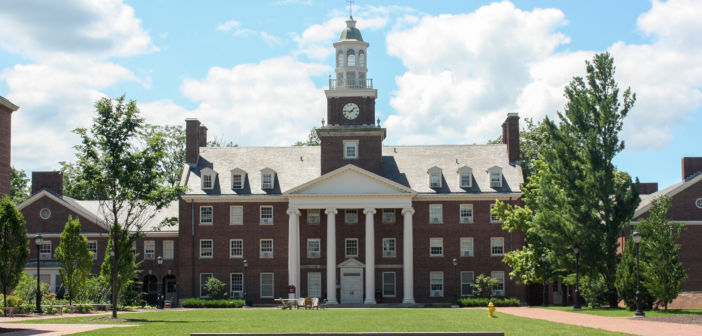The ripple effects of the coronavirus are seemingly endless, and the pandemic’s reach has begun to strangle colleges and universities nationwide.
Now, some schools like Penn State University, Rutgers University and Temple University are freezing tuition for the 2020-21 academic year.
But no school in the Lehigh Valley Association of Independent Colleges has announced it will take similar action — for now.
As the virus has torn through the country, infecting over one million Americans, universities were forced to move instruction remotely and thus provide refunds to students on room and board and cancel sporting events, conferences, and summer programming — all expected sources of revenue.
In an open letter, Rutgers President Robert Barchi announced the measures New Jersey’s largest state university will take to mitigate an anticipated $200 million shortfall in their current budget, which ends June 30. Senior administrators and athletic coaches will take a 10 percent reduction in salary over the next four months, Barchi said, and others will take a 5 percent pay cut.
In addition to the tuition freeze, a hiring freeze will continue, and the university will “urgently explore” furloughs and reductions in the university’s labor force. Barchi said the budget cuts are in response to hits to the New Jersey state’s budget as the state freezes a “significant portion of funding for Rutgers.”
“No aspect of our budget will be unaffected by the current crisis,” Barchi said. “However, although much remains to be determined about the coming budget year, one thing is certain — we cannot and will not close this gap on the backs of our students and their families.”
Lehigh, however, was noncommittal on freezing tuition.
“Lehigh is exploring several options, but no decisions have been made,” said Pat Johnson, Lehigh’s vice president of Finance and Administration, in an email. “I don’t expect us to announce any plans until after the semester ends.”
Lehigh’s tuition is scheduled to increase four percent next academic year. In 2019-20, tuition increased 4.4 percent, and in 2018-19, tuition increased 4.3 percent.
Between 2006 and 2017, tuition increased by 50 percent. The total expected cost for the 2020-21 academic year for a first-year student is $72,440.
Lehigh had recently announced a hiring freeze and the suspension of all scheduled salary increases in response to financial constraints brought by the pandemic. Lori Friedman, Lehigh’s media relations director, said some exceptions are being made to the school’s hiring freeze. In particular, job searches for a new Africana studies program director and a “modest number of searches” to grow the new College of Health faculty will be allowed to continue. The new college is expected to open this August as part of the university’s Path to Prominence.
“Under the current circumstances, growth will be slower for now, but we will continue to grow the faculty of the College of Health,” Friedman said in an email.
Other schools around the Lehigh Valley have also refrained from committing to a tuition freeze.
Lafayette College has implemented a similar hiring freeze and suspension of salary increases, promotions and bonuses. But in an email, Mark Eyerly, Lafayette’s vice president of communications and marketing, said the school’s projected 3.75 tuition increase is staying for now.
“We have not yet made a decision on whether to adjust those plans,” Eyerly said.
Moravian College and DeSales University confirmed in separate emails they also don’t have definitive plans for tuition costs for the next academic year yet. Kevin Nadolski, the vice president for Mission at DeSales, said the “tuition question remains an open one” and the university is “looking forward to next week’s Board of Trustees meeting for their consultation and input.”
Cedar Crest College and Muhlenberg College, the other two LVAIC schools, did not return multiple requests for comment. Neither schools’ website contained an announcement of a tuition freeze.
While the smaller, private LVAIC schools are sticking to their planned 2020-21 tuition prices for now, two larger public Pennsylvania institutions have gone forward with a tuition freeze. The Pennsylvania State system and Temple University are both keeping in-state tuition flat for the upcoming academic year.
“It is imperative that we give our students and their families some measure of certainty in these uncertain times,” said Penn State President Eric Barron in a news release. “No one knows how long this pandemic and the associated economic disruptions will last, but we want to do our part to ease the strain on our students by letting them know as early as possible that their tuition will not increase for the next academic year.”
Penn State reports that 65 percent of its students are in-state and Temple reports about three-quarters of its undergraduate population resides in Pennsylvania.
Plans for tuition freezes by Penn State, Temple and Rutgers are all pending approval by their respective boards.






Comment policy
Comments posted to The Brown and White website are reviewed by a moderator before being approved. Incendiary speech or harassing language, including comments targeted at individuals, may be deemed unacceptable and not published. Spam and other soliciting will also be declined.
The Brown and White also reserves the right to not publish entirely anonymous comments.
2 Comments
$72,440 for one year is disgusting. My Lehigh degree certainly isn’t worth 300k.
I’m surprised the B&W staff hasn’t taken some time off from their weekly “Orange Man Bad” column to do some real journalism and expose the truth about tuition. Honestly, how did we get here? Or perhaps it just doesn’t fit their narrative?